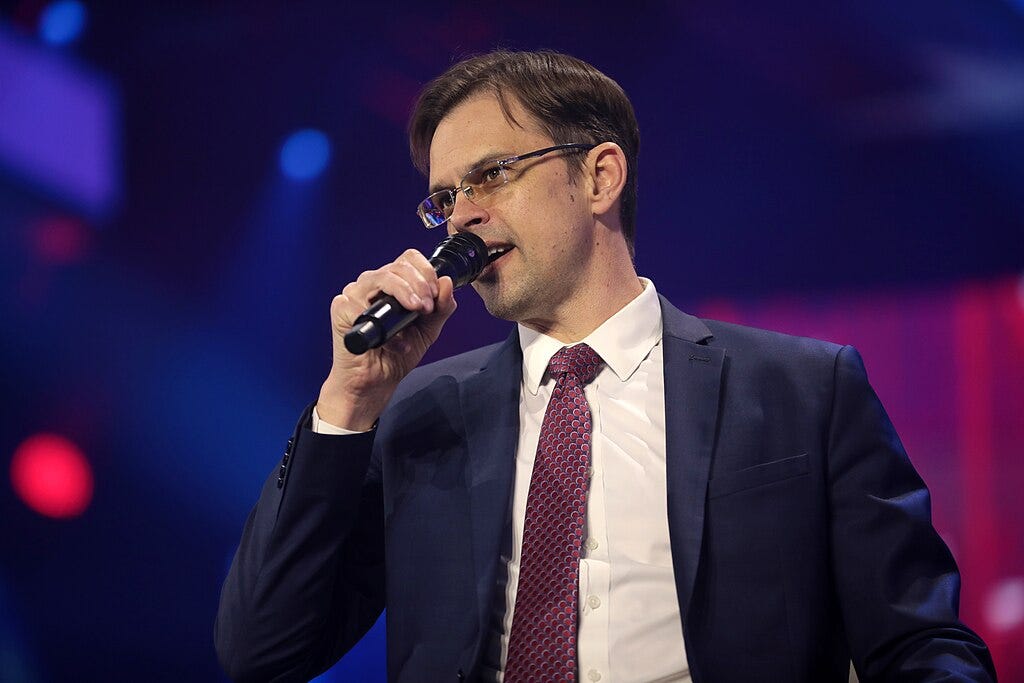Dr. Aaron Kheriaty on the Demise of Democracy and What Might Come Next
Bioethics expert Dr. Aaron Kheriaty says that competing political ideologies and liberal democracy are being replaced by a stealthily evolving technocratic biosecurity surveillance regime.
US psychiatrist, medical and bioethics expert, and former University of California professor, Dr Aaron Kheriaty, says that nowadays it doesn't matter so much what one's political views are or which party one supports. “The real division today is no longer left/right, liberal/conservative, or even Democrat/Republican. It is between those who will accept a technocratic biosecurity surveillance regime and those who will resist,” he says.
What does he mean by such a regime? If we look at the behaviour of the authorities all around the world during the Covid crisis, we can take a pretty good guess. Under the pretext of protecting public health, the authorities in most countries imposed strict movement restrictions and mandatory quarantine on perfectly healthy people, on top of closing down people's businesses on the pretext of limiting the spread of the virus, etc. In addition, however, the authorities introduced a system of vaccine passports. These passports were the cornerstone of a system that deprived people who did not agree to take hastily produced Covid vaccines of the possibility to move freely in public spaces, use public transport or other public services. In most countries they were not even allowed to make a living as their employers introduced vaccine mandates.
Foundations of a technocratic biosecurity surveillance regime
According to Kheriaty, a surveillance society aiming at biosecurity is based on three pillars: a visibly militarised public health apparatus, the deployment of digital surveillance and control technologies, and a militarized police force ensuring the system is adopted.
Kheriaty cites the example of Canada as one of the most ‘enthusiastic’ implementers of Covid-era coercion and biosecurity surveillance. Just think of the brute force used by the Canadian state in February 2022 to disperse people, led by truckers, who had been protesting for several weeks in the country’s capital Ottawa against vaccine coercion and senseless Covid rules. In addition, the state froze the assets of people and companies involved in the protests. It is important to note that the protest was entirely peaceful, but the Trudeau government decided to use the Emergencies Act to disperse it. Under this law, the federal government can declare a state of national emergency if something seriously endangers the health and safety of Canadians or seriously threatens the sovereignty, security, and territorial integrity of Canada. In essence, it is a law to be used in a situation of war – in 1988 it replaced the previous War Measures Act, but the new law had not once been used yet. The Act gives the federal government a great deal of power – for example, the right to ban and disperse assemblies or to freeze and confiscate the property of individuals.

The unprecedented use of the law was already heavily criticised back in 2022, and in February this year, a Canadian court ruled that its use was not justified. “His hand got slapped a little bit by the courts, but at the time, he not only used a militarised police force to disband the truckers, but they also froze the bank accounts with the cooperation of the banks in this corporatist model, this merging of state and corporate power,” Kheriaty comments on this particular example. However, it should be remembered that we actually saw similar behaviour by the authorities globally during the Covid crisis.
Kheriaty outlines what could be further developments of a regime that was already somewhat tested during Covid. “I think people should understand that during the next crisis, there's going to be attempts to institute central bank digital currencies, which is a system of financial controls, an exquisitely refined and terrifying system of financial controls. Those are going to be combined with digital IDs. Once you have a system with digital IDs and central bank digital currencies, the government and the powers that be will basically be able to lock you out of your ability to engage in any financial transactions if you do not comply with the government's orders,” he explains, adding that this way the authorities will at any time be able to track not only every cent, dollar or euro one spends but also one’s whereabouts. “Actually, your money will not really be money. It will turn into a temporary government voucher that can be rescinded,” Kheriaty explains. Kheriaty uses an example of a situation where the US government gives a citizen a $1,000 tax refund in the form of a central bank digital currency. This means that the person now has a currency that is controlled by the government because they can attach a condition to it that this digital currency must be spent within the next nine months. If you don't spend it, the value of that currency goes down e.g. by 10% every month for the next few months until it runs out. The government can also determine what you can spend the money on. So you cannot save such currency for your future needs or for retirement, for example. If you don't spend it, it dwindles and disappears, you can't give it to someone else, and the authorities can also determine what you can get for it in the first place. “So, what you have in your wallet is not a dollar or a euro, like you might have in a real wallet. What you have is a system of government control that can lock you in or lock you out of particular financial behaviors,” Kheriaty says.
The dream tools of dictatorships
According to Kheriaty, people need to understand the dangers of such systems. “It's going to be sold to us on the basis of convenience, frictionless transactions. If you forget your passport or your driver's license and you're at the airport, you can still board the plane because you're going to have a digital ID that will use biometric markers like a retinal scan or a fingerprint or a face ID to basically identify you,” he says. “But what people don't realize when they opt into a system like this is that the level of surveillance and tracking and control that it will permit goes far beyond anything that the totalitarian regimes of the past ever dreamed of,” Kheriaty adds, noting that for the likes of Hitler, Stalin, Mussolini, and others, it would have been the perfect toolbox to control people's behaviour, movements, transactions, what they can say, etc.

According to Kheriaty, he is not to be misunderstood. The development of digital technology is great and offers a lot of opportunities for people. For example, this article can easily be shared around the globe just sitting behind a desk. But with digital development come risks, which Kheriaty says should not be underestimated. China is the closest to formalising such a total surveillance society, with the widespread use of facial recognition systems as well as a social credit system that provides the basis for depriving people of services if their 'rating' falls too low because of 'bad behaviour'.
Kheriaty recalls that during the Beijing Olympics in 2022, all participants had to use the digital yuan. Participants, whether Chinese or foreign, had to download an app on their phone and all transactions had to go through it. So this has already been tried in China, and together with the digital ID and social credit system, it is the perfect control mechanism. “Western nations are actually unfortunately looking to that as a model for digital currencies in our own countries. I don't think it's outside the realm of possibility that in the next two to three years, we could see a major push for the adoption of digital currencies,” Kheriaty says.
What comes after liberal democracy?
The same goes for the development of a digital ID that uses technology to identify people by biometric data. Until recently, these seemed unlikely, but Kheriaty says that efforts are being made, for example in US airports, to deploy these systems. “If we don't look around and realize that they are happening and why they are happening, I think the danger is we're going to sort of go along step by step. And we're not going to wake up and realize that we're being surveilled and controlled in ways that 10 years ago we couldn't imagine,” Kheritay says and adds that such plans by the authorities should be rejected immediately.

And, as already noted, Kheriaty also says it must be understood that traditional political divisions over ideologies no longer matter. The question, he says, is whether we want a centrally controlled system that could potentially grow into a global one, or whether we would rather have a decentralised society in which as much decision-making as possible remains at the level of the individual and the family. While the choice on the matter should be unambiguously clear to any rationally minded person with a passing familiarity with the dictatorial regimes of the 20th century, the general movement around the world now seems to be in the opposite direction. Kheriaty argues that the whole world is now moving away from democracy and towards the consolidation of the power of a 'permanent state' or a 'deep state', in which important decisions are taken not by elected politicians but by the military intelligence apparatus of the administrative state. “While we still have elections, while we still have the facade or the appearance of a free society, actually the people who are really in control are operating behind the scenes and don't have to be subjected to the will of the people or the exigencies of an election or the ordinary pressures that can be placed on political actors,” he says. “And I think Covid was a massive acceleration of trends that have been developing probably for several decades. It's not exactly clear what is emerging in the wake of liberal democracies, but it's becoming increasingly clear I think to more and more people that what we thought were liberal democracies are actually not functioning that way anymore, in ways that they were supposedly functioning 50 years ago,” Kheriaty remarks.



What might come next after the demise of democracy, or more specifically a constitutional republic? Seriously? There is some question about the outcome? Why it will inevitably be followed in short order by chaos and a totalitarian state run by mediocraties. That has been the history of civilization from time immemorial.
"And, as already noted, Kheriaty also says it must be understood that traditional political divisions over ideologies no longer matter." Must disagree. The Republican point of view on limited government and attempting to reign in government intrusiveness is a far better choice than the Democrats who are pushing full blown globalist/WEF/marxist ideologies. The distinction in the party is still important--whether you want to arrive at global government overnight vs in a hundred years.